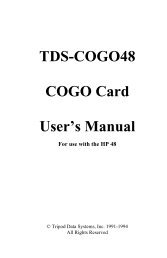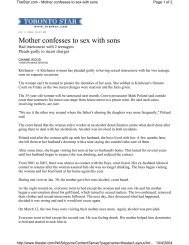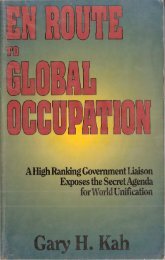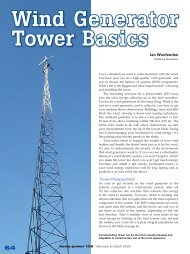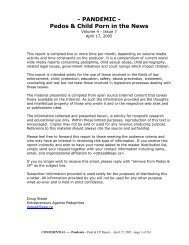G. Edward Griffin - The Fearful Master - PDF Archive
G. Edward Griffin - The Fearful Master - PDF Archive
G. Edward Griffin - The Fearful Master - PDF Archive
Create successful ePaper yourself
Turn your PDF publications into a flip-book with our unique Google optimized e-Paper software.
I may say for the delegates of the United States and for the National<br />
Commission in the United States, of which Mr. [Milton] Eisenhower is<br />
Chairman, that the constant effort of each individual is to discover and<br />
to determine what is best for UNESCO. <strong>The</strong> question we ask ourselves<br />
is never "What is best for the United States?" but "What is best for<br />
UNESCO?" 30<br />
In 1904 a naturalized American citizen by the name of Ion Perdicaris was taken as<br />
hostage in Morocco by a lawless Arab brigand named Raisuli, and held for ransom. <strong>The</strong><br />
sultan, Abdal-Aziz IV, was apparently not too concerned over the incident. President<br />
<strong>The</strong>odore Roosevelt immediately sent a U.S. warship to Morocco and delivered a<br />
message to the sultan that was both short and to the point. It read: "Perdicaris alive or<br />
Raisuli dead!" Within a very short time Perdicaris was safely aboard the U.S. warship.<br />
Fifty-four years later a similar situation arose. In Cuba a bearded bandit by the name of<br />
Fidel Castro kidnapped not one but forty-five American citizens, including sailors and<br />
marines from the nearby United States naval base at Guantanamo. In this case, however,<br />
President Eisenhower sent no telegrams nor did he dispatch any warships to pick up our<br />
captured citizens. <strong>The</strong> United States Government, in fact, did nothing, for under our<br />
commitment to the United Nations Charter, such an act would have been illegal.<br />
In 1904 we had not invented the nuclear bomb and we had not sent over 100 billion<br />
dollars of foreign aid around the world. Nevertheless, at that time the American flag and<br />
the citizens who gave it allegiance commanded and received respect and admiration<br />
everywhere. Today, it is not unusual for Americans to receive instead the jeers and taunts<br />
of the rest of the world. Our embassies have been burned, our officials have been spat<br />
upon, and in the capitals of the world "Yankee, go home" is chanted in the streets. What<br />
better proof could there be of the wisdom of General MacArthur's words: "<strong>The</strong>re is no<br />
substitute for victory."<br />
NOTES<br />
1. Eleanor Roosevelt, "<strong>The</strong> U.S. and the UN," ADA Guide to Politics--1954, P. 61.<br />
2. Albert C. Wedemeyer, Wedemeyer Reports (New York, Henry Holt & Company, Inc.,<br />
1958), p. 475.<br />
3. Military Situation in the Far East, hearings before the Senate committees on Armed<br />
Services and Foreign Relations (1951), pt. 1, pp. 436, 545; and pt. 3, p. 1991. Also,<br />
"Accept Chiang's Troop Offer, Knowland Urges," Los Angeles Examiner (July 11, 1950),<br />
sec. 1, p. 4. At this time Senator Knowland was a member of the Senate Committee on<br />
Armed Services.<br />
4. Military Situation in the Far East, hearings before the Senate committees on Armed<br />
Forces and Foreign Relations, final report (August 17, 1951), pt. 5, p. 3581.<br />
5. Speech by Anthony T. Bouscaren before the Congress of Freedom, Veterans War<br />
Memorial Auditorium (San Francisco, April 1955).<br />
6. Ibid.


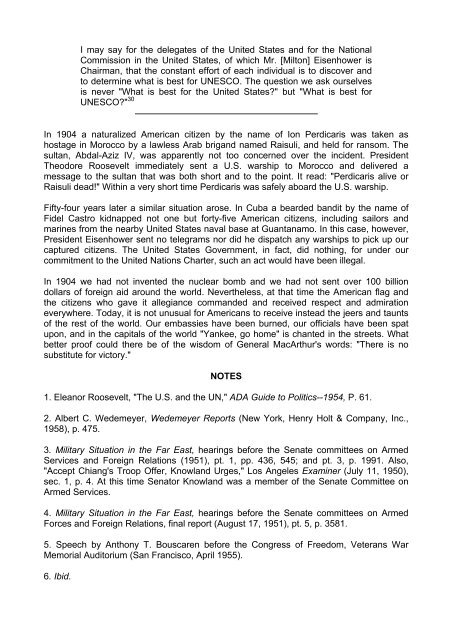
![Robert T McQuaid [rtmq@stn.net] Sent: Friday, October 29, 2004 12 ...](https://img.yumpu.com/51070071/1/190x245/robert-t-mcquaid-rtmqstnnet-sent-friday-october-29-2004-12-.jpg?quality=85)

